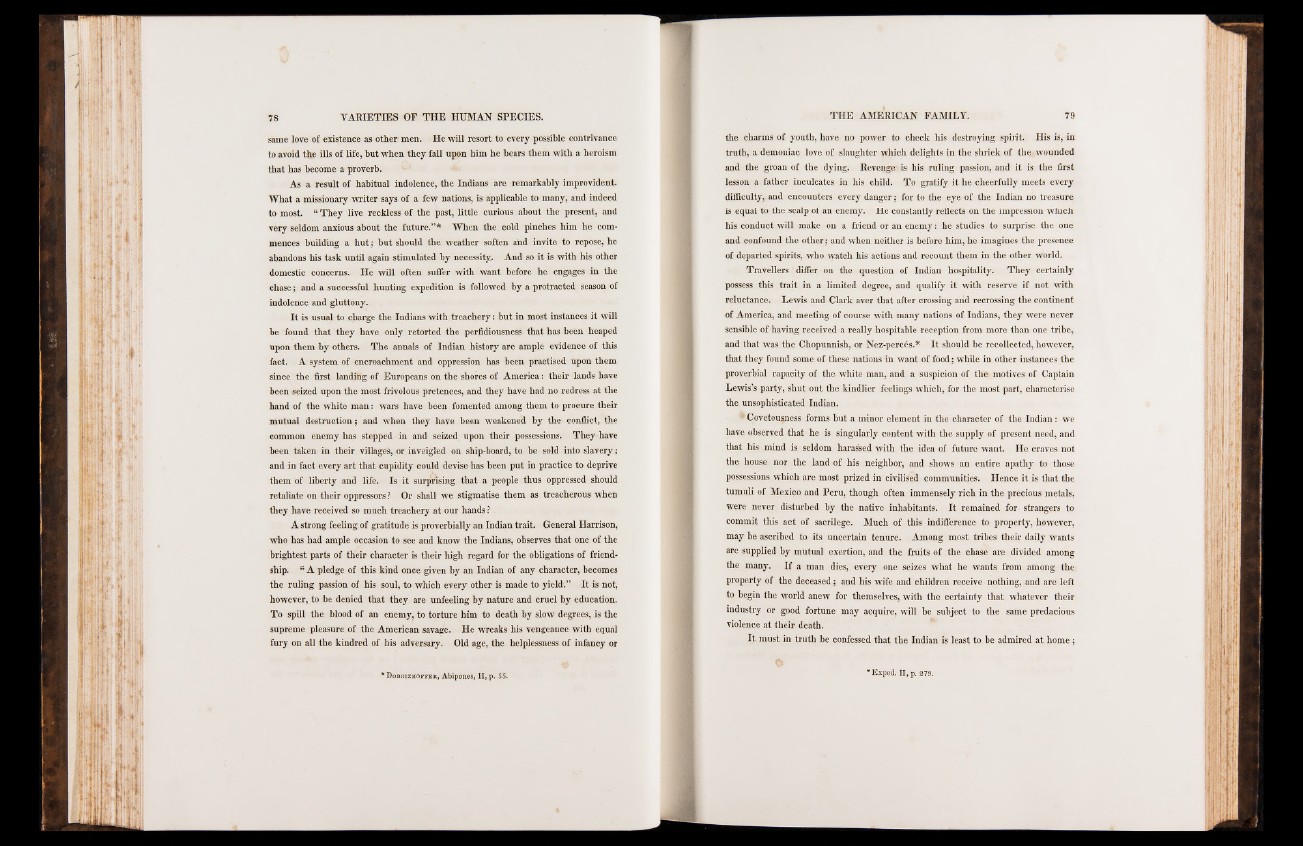
same love of existence as other men. He will resort to every possible contrivance
to avoid the ills of life, but when they fall upon him he hears them with a heroism
that has become a proverb.
As a result of habitual indolence, the Indians are remarkably improvident.
What a missionary writer says of a few nations, is applicable to many, and indeed
to most. “ They live reckless of the past, little curious about the present, and
very seldom anxious about the future.”* When the cold pinches him he commences
building a hut; but should the weather soften and invite to repose, he
abandons his task until again stimulated by necessity. And so it is with his other
domestic cpncerns. He will often suffer with want before he engages in the
chase; and a successful hunting expedition is followed by a protracted season of
indolence and gluttony.
I t is usual to charge the Indians with treachery: hut in most instances it will
he found that they have only retorted the perfidiousness that has been heaped
upon them by others. The annals of Indian history are ample evidence of this
fact. A system of encroachment and oppression has been practised upon them
since the first landing of Europeans on the shores of America: their lands have
been seized upon the most frivolous pretences, and they have had no redress at the
hand of the white man: wars have been fomented among them to procure their
mutual destruction; and when they have been weakened by the conflict, the
common enemy has stepped in and seized upon their possessions. They have
been taken in their villages, or inveigled on ship-hoard, to he sold into slavery;
and in fact every art that cupidity could devise has been put in practice to deprive
them of liberty and life. Is it surprising that a people thus oppressed should
retaliate on their oppressors ? Or shall we stigmatise them as treacherous when
they have received so much treachery at our hands ?
A strong feeling of gratitude is proverbially an Indian trait. General Harrison,
who has had ample occasion to see and know the Indians, observes that one of the
brightest parts of their character is their high regard for the obligations of friendship.
“ A pledge of this kind once given by an Indian of any character; becomes
the ruling passion of his soul, to which every other is made to yield.” It is not,
however, to be denied that they are unfeeling by nature and cruel by education.
To spill the blood of an enemy, to torture him to death by slow degrees, is the
supreme pleasure of the American savage. He wreaks his vengeance with equal
fury on all the kindred of his adversary. Old age, the helplessness of infancy or
Dobrizhoffer, Abipones, II, p. 55.
the charms of youth, have no power to check his destroying spirit. His is, in
truth, a demoniac love of slaughter which delights in the shriek of the.wounded
and the groan of the dying. Revenge^ is his ruling passion, and it is the first
lesson a father inculcates in his child. To gratify it he cheerfully meets every
difficulty, and encounters every danger; for to the eye of the Indian no treasure
is equal to the scalp of an enemy. He constantly reflects on the impression which
his conduct will make on a friend or an enemy: he studies to surprise the one
and confound the other; and when neither is before him, he imagines the presence
of departed spirits, who watch his actions and recount them in the other world.
Travellers differ on the question of Indian hospitality. They certainly
possess this trait in a limited degree, and qualify it with reserve if not with
reluctance. Lewis and Clark aver that after crossing and recrossing the continent
of America, and meeting of course with many nations of Indians, they were never
sensible of having received a really hospitable reception from more than one tribe,
and that was the Chopunnish, or Nez-perces.* It should be recollected, however,
that they found some of these nations in want of food; while in other instances the
proverbial rapacity of the white man, and a suspicion of the motives of Captain
Lewis’s party, shut out the kindlier feelings which, for the most part, characterise
the unsophisticated Indian.
* Covetousness forms but a minor element in the character of the Indian: we
have observed that he is singularly content with the supply of present need, and
that his mind is seldom harassed with the idea of future want. He craves not
the house nor the land of his neighbor, and shows an. entire apathy to those
possessions which are most prized in civilised communities. Hence it is that the
tumuli of Mexico and Peru, though often immensely rich in the precious metals,
were never disturbed by the native inhabitants. I t remained for strangers to
commit this act of sacrilege. Much of this indifference to property, however,
may be ascribed to its uncertain tenure. Among most tribes their daily wants
are supplied by mutual exertion, and the fruits of the chase are divided among
the many. If a man dies, every one seizes what he wants from among the
property of the deceased; and his wife and children receive nothing, and are left
to begin the world anew for themselves, with the certainty that whatever their
industry or good fortune may acquire, will be subject to the same predacious
violence at their death.
It must in truth be confessed that the Indian is least to be admired at home;
Exped. II , p. 279.